Medical expert of the article
New publications
Overview of effective treatments for asthenia
Last reviewed: 06.07.2025

All iLive content is medically reviewed or fact checked to ensure as much factual accuracy as possible.
We have strict sourcing guidelines and only link to reputable media sites, academic research institutions and, whenever possible, medically peer reviewed studies. Note that the numbers in parentheses ([1], [2], etc.) are clickable links to these studies.
If you feel that any of our content is inaccurate, out-of-date, or otherwise questionable, please select it and press Ctrl + Enter.
Many patients who experience causeless weakness and constant fatigue wonder which doctor to contact for asthenia?
Asthenia is treated depending on the disease it is associated with. If the disease appeared as a result of emotional or physical overexertion, stress, neurosis, then they turn to psychologists, psychiatrists, psychoneurologists or psychotherapists.
Children are treated by a pediatrician, who can refer them to another specialist if necessary. If the pathology is post-infectious or traumatic in nature, then therapists, surgeons and neurologists are consulted during the treatment process.
Remedies for asthenia
Today, there are many means used to treat vegetative pathologies. Various approaches allow you to quickly and effectively eliminate the disease. Since the disease is associated with the expenditure of vital and mental energy, the patient needs a good rest, a change of environment and type of activity. This will allow the body to rest and accumulate energy. But sometimes these recommendations are impossible to implement for one reason or another. Therefore, they resort to drug therapy.
- Nootropic or neurometabolic agents are safe and affordable medications for eliminating psychopathological disorders. But their clinical effectiveness remains unproven, since not all symptoms of the disorder can be controlled. Because of this, this category of drugs is used with varying intensity in different countries. In Ukraine, they are widely used, but in America and Western Europe, they are rarely used.
- Antidepressants are serotonin reuptake inhibitors and are used to treat asthenic symptoms and signs of depression.
- Atypical antipsychotics or neuroleptics are effective in vital-asthenic conditions.
- Psychostimulants - this category of medications is prescribed by a psychiatrist with appropriate indications for use. They also include procholinergic agents.
- NMDA receptor blockers – help with cognitive impairment due to cerebral atherosclerosis and other pathologies that cause cognitive impairment.
- Adaptogens are herbal remedies. Most often, patients are prescribed ginseng, Chinese magnolia vine, pantocrine, rhodiola rosea and eleutherococcus.
- B vitamins – this method of therapy is popular in the USA, but is limited in use due to high risks of allergic reactions. Therefore, optimal vitamin therapy is used, which includes vitamins of group B, C and PP.
All of the above mentioned means require appropriate indications for use. However, in general medical practice their use is limited.
Stimol for asthenia
Stimol is an oral solution with the active ingredient citrulline malate. The active substance activates energy production at the cellular level. The mechanism of action is based on increasing the ATP level, reducing the lactate level in the blood plasma and tissue, and preventing metabolic acidosis. Stimulates the removal of metabolic products from the body, eliminates emotional lability and fatigue, and increases performance.
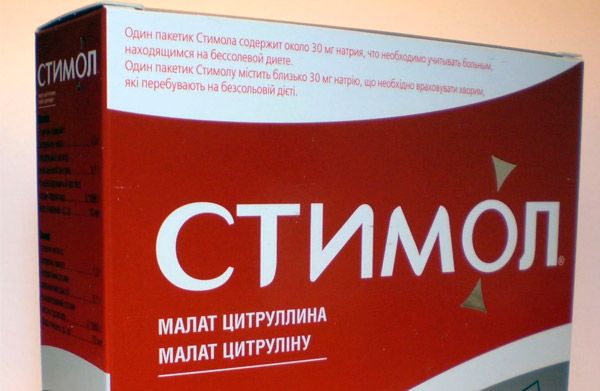
- Used to treat asthenia of various genesis, including senile, sexual, post-infectious, physical. Helps with weakness, drowsiness, emotional lability, increased fatigue. Can be used by patients with vegetative-vascular dystonia of the hypotonic type and with withdrawal syndrome.
- Taken orally, well absorbed in the intestine. Maximum concentration in plasma occurs 45 minutes after administration. Excreted within 5-6 hours. Before use, the powder must be dissolved in ½ glass of water. The dosage and duration of treatment are determined by the attending physician. But, as a rule, adults and adolescent patients are prescribed 1 sachet (10 ml) 3 times a day. For patients under 15 years old, 10 ml 2 times a day.
- Side effects may include only discomfort in the stomach area. Not recommended for use in case of intolerance to the active substance and other components. Not prescribed to patients with peptic ulcer of the stomach and duodenum, pregnant women and patients under 6 years of age.
Phenibut for asthenia
Phenibut is a nootropic agent, gamma-amino-beta-phenylbutyric acid hydrochloride. It has a tranquilizing, psychostimulating and antioxidant effect, facilitates the transmission of nerve impulses to the central nervous system. Improves cerebral circulation, reduces anxiety, fear, and restlessness. Helps normalize sleep and has an anticonvulsant effect.
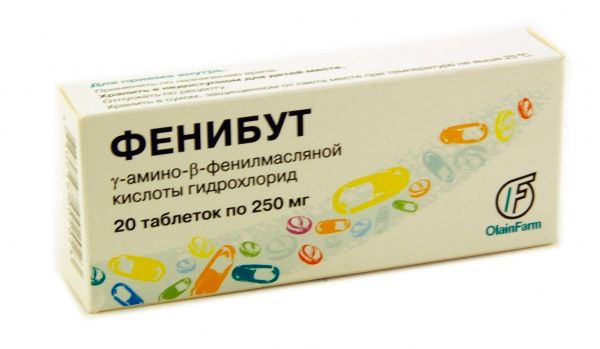
- After oral administration, it is quickly absorbed and penetrates into all tissues of the body. It is evenly distributed in the kidneys and liver, and is metabolized in the liver by 80-90%. It does not accumulate, and the metabolites are pharmacologically inactive. It is excreted by the kidneys 3-4 hours after administration, but the high concentration in the brain tissues lasts for 6 hours. 5% of the substance is excreted unchanged by the kidneys and part with bile.
- It is prescribed for the treatment of anxiety-neurotic conditions, asthenia, anxiety, fear, obsessive states, psychopathy. It helps in the treatment of enuresis and stuttering in children and insomnia in elderly patients. The drug is effective in dysfunctions of the vestibular analyzer, as well as motion sickness. It can be used as a complex therapy for alcoholism.
- The tablets are taken orally, regardless of food intake. The dosage and duration of treatment depend on the indications, individual characteristics of the patient's body and his age. A single dosage for adults is 20-750 mg, and for children 20-250 mg.
- Contraindicated for use in case of hypersensitivity to active substances. With special caution, prescribe to patients with liver failure, erosive and ulcerative lesions of the gastrointestinal tract. Long-term use requires monitoring of liver function and peripheral blood. During pregnancy and lactation, it is used with appropriate medical indications.
- Side effects cause increased irritability, anxiety, headaches and dizziness, drowsiness. Attacks of nausea and allergic reactions on the skin are possible. When used simultaneously with sleeping pills, analgesics, antipsychotics and antiepileptic drugs, it enhances their effect.
Grandaxin for asthenia
Grandaxin is a tranquilizer with the active substance tofisopam. The drug belongs to the group of benzodiazepine derivatives. It has an anxiolytic effect, but is not accompanied by a sedative, anticonvulsant effect. The psychovegetative regulator eliminates vegetative disorders, has moderate stimulating activity.
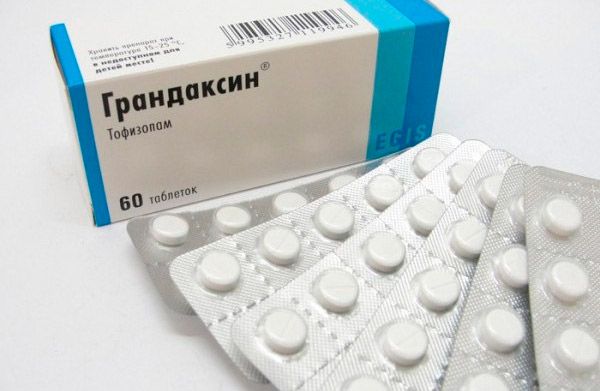
- After oral administration, it is rapidly and almost completely absorbed from the gastrointestinal tract. The maximum concentration in the blood plasma is maintained for two hours after administration and decreases monoexponentially. The active component does not accumulate in the body, the metabolites do not have pharmacological activity. It is excreted by the kidneys 60-80% with urine and about 30% with feces.
- It is used to treat neuroses, apathy, depression, obsessive-compulsive disorder, post-traumatic stress disorder, climacteric syndrome, myopathy, premenstrual tension syndrome and alcohol withdrawal.
- The dosage is individual for each patient and depends on the clinical form of vegetative disease. Adults are prescribed 50-100 mg 1-3 times a day, the maximum daily dose should not exceed 300 mg. For patients with renal failure, the dose is reduced by half.
- Overdose causes suppression of the central nervous system, vomiting, coma, epileptic seizures, confusion and respiratory depression. Treatment is symptomatic. Side effects provoke insomnia, seizures, headaches, gastrointestinal problems, various allergic reactions, muscle and joint pain.
- Contraindicated for use in respiratory failure and sleep apnea, severe psychomotor agitation and deep depression. Do not use in the first trimester of pregnancy and during lactation, in case of galactose intolerance, hypersensitivity to benzodiazepines. Use with special caution in case of organic brain damage, glaucoma, epilepsy.
Teraligen for asthenia
Teralidzhen is an antipsychotic, neuroleptic drug. It has a moderate antispasmodic, antihistamine effect. The active ingredient is alimemazine, which has an antipsychotic effect. Due to the blockade of adrenoreceptors, a sedative effect occurs.
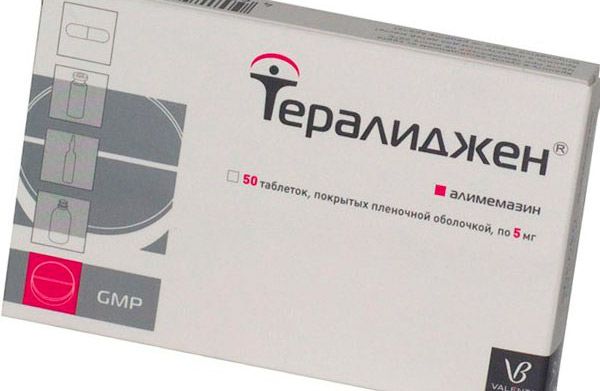
- After oral administration, the active component is quickly and completely absorbed in the digestive tract. The maximum concentration in the blood plasma is maintained for 1-2 hours. Protein binding is at the level of 30%. It is excreted by the kidneys as a metabolite, the half-life is 3-4 hours, about 70% is excreted within 48 hours.
- It is used to treat neuroses, asthenia, increased anxiety, apathy, psychopathy, phobic, senestopathic and hypochondriacal ailments. It helps with sleep disorders, and can be used as a symptomatic therapy for allergic reactions.
- The tablets are taken whole, without chewing, with a sufficient amount of water. Adults are prescribed 50-100 mg for the treatment of psychotic conditions, children 15 mg 2-4 times a day. The maximum daily dosage for adults is 400 mg, for children 60 mg.
- Side effects occur on the nervous system, causing increased drowsiness and confusion. In addition, decreased visual acuity, tinnitus, dry mouth, constipation, irregular heartbeat, urinary retention, and allergic reactions are possible.
- Contraindicated for patients with individual sensitivity to the active substance and additional ingredients. Do not prescribe to patients with glucose-galactose malabsorption syndrome and lactase deficiency. It is prohibited to use in patients taking monoamine oxidase inhibitors. With special caution, prescribe to patients with chronic alcoholism, epilepsy, jaundice, arterial hypotension and bone marrow suppression. Do not use during pregnancy and lactation.
Cytoflavin for asthenia
Cytoflavin is a medicinal product that affects tissue metabolism processes. It is a metabolic product with cytoprotective properties. It activates energy production and respiration in cells, restores the body's antioxidant defense, stimulates protein synthesis in cells, and participates in the rapid utilization of fatty acids. These effects restore the intellectual and mnestic properties of the brain, improve coronary and cerebral blood flow.
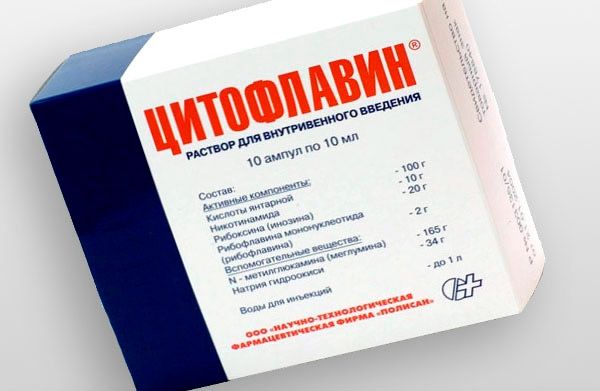
- The medicine is available in the form of tablets and infusion solution. The medicine contains several active ingredients: succinic acid, nicotinamide, riboflavin mononucleotide and inosine. After use, it is quickly distributed in all tissues, penetrates the placenta and into breast milk. It is metabolized in the myocardium, liver and kidneys.
- Prescribed as part of complex therapy to eliminate acute cerebrovascular accidents, chronic cerebral ischemia, vascular encephalopathy, increased fatigue and asthenic disease.
- The solution is used only intravenously by drip, diluted with 0.9% sodium chloride solution or glucose solution. The tablets are taken in the morning and evening, 30 minutes before meals, 2 times a day, 2 pieces. The course of treatment is 25-30 days.
- Side effects cause a feeling of heat, hyperemia of the skin, sore throat, bitterness and dryness in the mouth. Exacerbation of gout is possible. In rare cases, discomfort in the epigastric region, short-term pain in the chest, nausea, headaches, allergic reactions appear. Contraindicated for use during breastfeeding, decreased partial pressure. As for use during pregnancy, if a woman does not have allergic reactions to the components of the drug, then it can be used.
Vitamins for asthenia
Vitamin therapy for asthenic syndrome is carried out regardless of the form of the disease and its clinical features. For therapeutic purposes, vitamins of group B are used, as they restore vital resources and energy reserves of the body.
Let's take a closer look at each of the vitamins in this group:
- B1 – thiamine synthesizes bioactive amines, affects metabolic processes, participates in the breakdown of glucose, that is, helps convert food into energy. It is necessary for the normal functioning of the body, its deficiency affects the work of all organs and systems, especially the central nervous system. It is not synthesized in the body, so it must be supplied with food.
- B6 – pyridoxine hydrochloride, participates in the metabolic process. Synthesizes mediators of the nervous system, which are needed to transmit nerve impulses and synthesize hemoglobin. This substance stimulates the work of bone marrow, antibodies and blood cells, affects the condition of the skin. Its regular use prevents the development of paresthesia and convulsions. It is synthesized in small quantities by intestinal microflora.
- B12 – cyanocobalamin, participates in the metabolism of carbohydrates, proteins and fats. Regulates the nervous and digestive systems.
Vitamin deficiency can be the cause of the development of psychopathological syndrome. With a deficiency of useful substances, increased nervousness, sleep disorders, decreased performance, fatigue, digestive system disorders and asthenia appear. The use of vitamins is part of a complex of treatments and measures to restore the normal functioning of the body.
Folk remedies for asthenia
Along with traditional methods of treating asthenia, folk remedies are also used. Such therapy is based on the use of plant components to restore the normal functioning of all organs and systems.
Effective and simple remedies for vegetative ailments, nervous exhaustion and neuroses:
- Grind 300 g of walnuts, two heads of garlic (boiled) and 50 g of dill. Mix all the ingredients well, pour in 1 liter of honey and let it brew in a dark, cool place. Take 1 spoon 1-2 times a day before meals.
- Grind walnuts and pine nuts to a flour state, mix with honey (linden, buckwheat) 1:4. Take 1 spoon 2-3 times a day.
- Mix a spoonful of flax seeds with 20 g of chamomile, pour 500 ml of boiling water and let it brew for 2-3 hours. After the remedy has brewed, add a spoonful of honey and take 100 ml 3 times a day before meals.
- Grind dates, almonds and pistachios in a 1:1:1 ratio. Use the resulting mixture 2 times a day, 20 g each time.
- Warm baths with essential oils have restorative properties. Add a few drops of cloves, lemon oil, cinnamon, ginger or rosemary to the water. This will help you relax and fall asleep quickly.
- Grind 250 g of rose hips, 20 g of St. John's wort and calendula flowers. Mix all ingredients thoroughly and add 500 ml of honey. The remedy should be infused for 24 hours, take one spoon 3-5 times a day.
- A herbal mixture of motherwort, mint, oregano and hawthorn will help cope with irritability and fits of anger. All ingredients are taken in equal proportions, poured with 250 ml of boiling water and infused. Take 1/3 cup 3-4 times a day.
- Prepare 100-150 ml of freshly squeezed carrot juice and add a spoonful of honey. The drink helps with loss of strength and fatigue.
- Take equal parts of thyme, rosea rhodiola and leuzea root, mix and pour 250 ml of boiling water. Leave for 1-2 hours, strain, add a spoon of honey and 5 g of ginger powder. Take ¼ cup 3-4 times a day.
In addition to taking the above-described remedies, spend more time outdoors, get enough sleep, rest, and don’t forget about a healthy diet.
 [ 13 ], [ 14 ], [ 15 ], [ 16 ], [ 17 ]
[ 13 ], [ 14 ], [ 15 ], [ 16 ], [ 17 ]
Herbs for asthenia
Herbs in the treatment of neurological and asthenic diseases are included in the category of folk remedies. The advantage of using herbal ingredients is naturalness, minimum side effects and contraindications.
Effective herbs for psychopathologies:
- Aralia Manchuriana
An alcohol tincture is prepared from the roots of the plant, which stimulates the work of the heart muscle. To prepare the remedy, the crushed roots of the plant are poured with 70% alcohol in a ratio of 1:6 and infused for two weeks in a warm place. The medicine must be filtered and taken 30 drops 2-3 times a day, the course of treatment is a month.
- Eleutherococcus senticosus
Effectively stimulates the central nervous system, improves mental and physical performance, accelerates metabolism, and improves visual acuity. The plant increases appetite and reduces blood sugar levels. Helps in the treatment of nervous system pathologies, depression, and hypochondriacal conditions. To prepare the tincture, take 200 g of plant roots per 1 liter of vodka. The mixture is infused in a dark, warm place for 2 weeks, shaking constantly. The tincture should be filtered and taken 30 drops in the morning and evening.
- Schisandra chinensis
A tonic and stimulating agent for the nervous system. Excellently increases physical and mental performance, protects the body from adverse environmental effects. Helps with psychosthenia, reactive depression. The medicine is prepared from the seeds or fruits of the plant. Take 10 g of dried lemongrass fruits and pour 200 ml of boiling water. Take 1 spoon of the infusion 1-2 times a day.
- Rhodiola rosea
Preparations from this plant improve performance, restore strength, help with neuroses and neurotic pathologies. Their daily use reduces irritability, improves attention and memory. Tincture is prepared from the root of Rhodiola. Pour 200 ml of vodka over 20 g of crushed root, leave for 2 weeks in a dry, warm place. The therapeutic dose is 25 drops 2-3 times a day.
- Leuzea carthamoides
Stimulates the central nervous system, helps with hypochondria, vegetative diseases, impotence. Has a general strengthening, tonic effect, relieves fatigue and weakness. Take 40 drops of the infusion, diluted in 30 ml of water 1-2 times a day.
- Coffee
Natural stimulant of the central nervous system, relieves fatigue and drowsiness, improves heart function, increases performance, relieves muscle fatigue. Excessive caffeine consumption can lead to hypertension and even myocardial infarction. Contraindicated for patients with heart defects, hypertensive patients, angina pectoris and heart failure.
Homeopathy for asthenia
Homeopathic therapy involves the use of small doses of substances that in large doses cause pathological symptoms. Treatment by this method is based on the elimination of the primary disease that caused the signs of a nervous disorder. The malaise is characterized by increased fatigue, decreased performance, rapid exhaustion, both physical and mental.
Traditional medicine uses psychostimulants and sedatives to eliminate the disease. Homeopathy involves the use of harmless medications that do not cause addiction and side effects. Such drugs do not regulate, but do not suppress the functions of the brain and central nervous system. The drug should be selected by a doctor, indicating the dosage and duration of therapy. The most commonly used drugs are: ignatia, nux vomica, thuja, gelsemium, actea racemosa, platinum, cocculus and others. The ginseng drug Ginseng has proven itself well. It relieves fatigue, tones, gives strength and energy. Helps with fatigue of a traumatic nature, increased weakness in elderly patients. Eliminates hand tremors and muscle strain.
Homeopathy is used in combination with other methods, for example, acupuncture, hirudotherapy and color therapy. The integrated approach is more effective, as it helps to quickly eliminate the symptoms of the syndrome. But the main advantage of the method is the ability to lead a normal life.
Psychostimulants for asthenia
Psychostimulants are drugs that temporarily improve physical and mental performance. The positive effect is achieved by mobilizing the body's reserve capabilities, but long-term use of pills depletes them. Unlike drugs that depress the central nervous system, psychostimulants lack selectivity of action, since after stimulation, depression of the nervous system occurs.
This group of products quickly eliminates fatigue, weakness, helps fight irritability and emotional instability. They can be considered a kind of doping for the nervous system, which temporarily eliminates asthenic symptoms.
Classification of psychostimulants:
- Agents affecting the central nervous system:
- Stimulating the cerebral cortex - Meridol, Phenamine, Methylphenamine, Xanthine alkaloids.
- Spinal cord stimulants - Strychnine.
- Stimulating agents for the oblong brain include: Carbon dioxide, Bemegride, Camphor, Cordiamine.
- Acting on the nervous system reflexively - Lobeline, Nicotine, Veratrum.
The above classification is considered conditional, since if the drugs are prescribed in large doses, they stimulate the central nervous system completely. The medicine is prescribed by the attending physician, since such drugs require a prescription for purchase.
Psychotherapy for asthenia
Psychotherapy in the treatment of asthenic conditions refers to additional methods, since the main emphasis is on drug therapy. It is a system of psychological influence on the patient's body. It eliminates symptoms and the traumatic circumstances that caused them, that is, it minimizes the negative impact of psychotraumatic factors. It can be used as a method of rehabilitation and psychoprophylaxis.
To create a treatment program, the doctor conducts psychological diagnostics and makes a plan. Therapy can be group or individual. The success of its use lies in close contact between the patient and the psychotherapist or psychologist. But to improve well-being, it is necessary to follow the daily routine, take vitamins and eat a good diet. Regular consultations with a psychologist will help to understand and eliminate the true causes of the disease.
Treatment of asthenia after flu
Treatment of asthenic syndrome after flu refers to the therapy of post-infectious psychopathological diseases. As a rule, parasitic, bacterial, viral and fungal infections make themselves known a short time after recovery. Unpleasant symptoms can last from 2-4 weeks. The main causes of the disease are metabolic acidosis and tissue hypoxia, which occur due to viral intoxication. Oxygen deficiency disrupts the energy metabolism of cells and accumulates oxidation products, which reduces the absorption of oxygen by tissues and aggravates acidosis at the metabolic level.
In order to cure increased weakness and unreasonable fatigue after the flu, it is necessary to restore the body's metabolic balance. Stimol has proven itself in treatment. It improves well-being in a short time. In addition, patients are prescribed vitamin therapy (vitamins B, C, PP), good nutrition and rest, frequent walks in the fresh air, a minimum of stress and more positive emotions.

